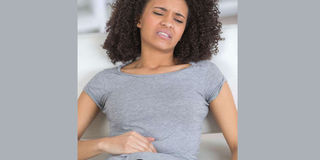Bowel issues: Dealing with bloating and piles

Bloating can cause stomach pain and discomfort. PHOTO | FILE | NATION MEDIA GROUP
Dr Flo, I have a lot of gas in my stomach and when I try to go to the toilet nothing comes out. I have taken some medication, but I can feel some pain that was not there before. Please tell me what to do. CK
Dear CK,
Having a lot of gas in the stomach is called bloating. You feel pain, full and uncomfortable, and the tummy may appear bigger than usual.
It can be caused by overeating, eating too fast, eating very fatty foods, drinking through a straw, chewing gum and taking carbonated drinks like soda. Some foods like beans, lentils, and other legumes, cabbage, cauliflower, Brussels sprouts and artificial sweeteners like sorbitol, can also cause gassiness. For people who are lactose intolerant (have trouble digesting milk), taking dairy products can also cause gassiness. Smoking can also lead to bloating.
The increased gassiness may also be due to infection e.g. amoebiasis, H.Pylori infection; hyperacidity, irritable bowel syndrome, indigestion, poor absorption, constipation, food allergy, illnesses that cause inflammation of the lining of the intestines, intestinal obstruction, problems with the movement of the intestinal muscles, problems with other abdominal organs like the kidney, liver or spleen, and in rare occasions, abdominal or pelvic cancers.
To manage it, eat slowly, take smaller portions of food, and avoid fatty foods and any other foods that increase gas. You can keep a food diary – record what you eat each day and monitor your symptoms to see which foods may be worsening the symptoms.
You can also take simethicone tablets to reduce the gas. Medicine with alpha-D-galactosidase helps break down sugars in beans and vegetables and reduce the excess gas. It would be good to visit a doctor so that you can be reviewed and have stool tests and any other relevant tests done for a proper diagnosis and treatment.
***
Dr Flo, what are piles and what causes them? What are the symptoms and what is the treatment? Joe
Dear Joe,
Piles (haemorrhoids) are veins that bulge out from the lower part of the rectum and anus.
The walls of the veins stretch and get irritated, and easily get a tear and bleed, especially when passing stool. The piles may be on the outside around the anal opening, or may “come out” when passing stool, and sometimes can be pushed back in. These are called external haemorrhoids. If there are far up inside that they cannot be seen or felt, they are called internal haemorrhoids.
Symptoms include a painful or itchy swelling at the anal opening, and pain or bleeding when passing stool.
They can be caused by straining when passing stool e.g. due to constipation or diarrhoea; any activity that causes repeated high pressure in the abdominal region e.g. a persistent cough or lifting weights. They are also more common in people who stand or sit for long periods of time, and during pregnancy.
Most of the time, they resolve easily with diet and lifestyle changes, and with treatment, though they can recur.
To manage the problem, prevent constipation by taking a lot of fluid and a high-fibre diet every day; exercise; schedule time for a bowel movement every day and take your time; use baby wipes instead of toilet paper and take a sitz bath by sitting in warm water for about 20 minutes twice a day to help soothe the injured tissue.
You can take fibre supplements to help with passing soft stool, or take laxatives and stool softeners prescribed by a doctor.
Creams and suppositories can help with the healing of the torn tissue, and oral tablets may be prescribed to heal the veins.
If symptoms persist despite these measures, surgery may be done to correct the problem.
Send your medical questions to [email protected] for free expert advice


